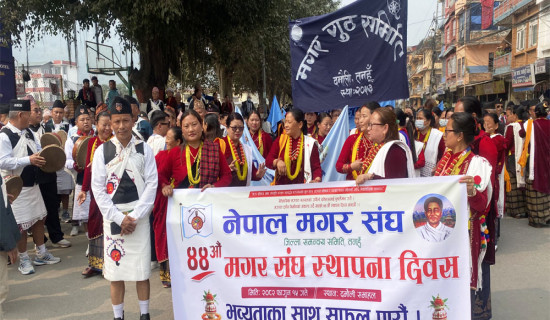- Friday, 27 February 2026
Amir's Visit Boosts Nepal-Qatar Relations
The recent visit of Qatar's Emir, Sheikh Tamim bin Hamad Al Thani, to Nepal is significant because it provided another platform for Nepal to consolidate its relations with Qatar. This was the first visit by a Qatari King to the Himalayan nation, which provides a significant labour force to a tiny Gulf state that ranks among the world's ten richest countries. It has been making steady progress in recent years despite facing sanctions from its neighbours- Saudi Arabia, the UAE and others.
The fact that none other than our President travelled to the airport to greet the special guest, who ascended to Qatar's throne in 2013 after his father Hamad abdicated in his favour, indicates the significance of the Qatar King's presence in Nepal. During his two-day stay, Prime Minister Pushpa Kamal Dahal Prachanda met with him twice, which further highlighted the value of the visit.
Nepali workers' contribution
The importance of the Nepali labour force in assisting Qatar's development was highlighted when the visiting monarch waxed eloquent about the contribution of Nepali migrant workers who assisted his petroleum and gas-rich nation in expediting infrastructure development, particularly the construction of modern stadiums that helped Qatar successfully organise the FIFA World Cup 2022. Previously, the world's football governing body had not permitted any country in the Middle East or the Gulf States to host the world's football extravaganza, owing mostly to unfavourable weather conditions in these regions, which are marked by blistering heat for most of the year.
However, the Qatari authorities turned all of this on its head by building eight stadiums with air conditioning and convincing the authorities to hold the tournament in the winter of 2022, preventing the desert heat of the Middle East from taking its toll on players and spectators. Many Nepali workers, including engineers and other semi and non-skilled workers, contributed in building stadiums and some of them perished while working.
Currently, around 400,000 Nepali workers are residing in Qatar, where they provide labour in exchange for remuneration, greatly assisting Nepal in gaining a substantial amount of remittances. Qatar has become a popular labour destination for Nepali migrants, particularly those who are unskilled or semi-skilled. Despite accusations of worker exploitation, Qatar has remained an appealing destination for all types of Nepali labour.
It is disheartening that even during the high-profile visit from Qatar's King, Nepal was unable to execute agreements with Qatari authorities on key labour issues to protect Nepali workers' interests. The Nepali authorities had earlier hyped signing accords aimed at benefiting Nepali workers in Qatar, but it appeared that the Qatari authorities did not think they were worthy of being signed so as to providing Nepali workers with more leverage. It appears that, after failing to sign agreements on matters that Nepal considers crucial for preserving the rights of Nepali workers, Qatari authorities intended to maintain the status quo in terms of Nepali labour conditions.
Qatar and other Gulf states, such as the UAE, Oman, Bahrain, Kuwait, and even Saudi Arabia, often provide higher remuneration to workers from India and Pakistan, as well as the Philippines, because they have agreements with these countries to provide certain amounts of salaries and other benefits to their nationals working in the aforementioned states. However, Nepalis and a few other nationals are among those who are given lower wages despite working in the Middle East's harsh and terrible conditions. Many Nepali experts say that our government should compel the Gulf States, particularly Qatar, to reach an agreement that would benefit our workers or put them on par with Indian and Pakistani nationals in terms of salary and facilities. This appears to have been the reason for Qatar's rejection of signing the labour agreement with Nepal.
Mistreatment
Meanwhile, because of the lack of a labour agreement, many innocent Nepali workers have been victimised by government officials in Qatar, a Muslim country, as well as enterprises that hire Nepalis. Workers in Nepal and Qatar are also subjected to fraud and mistreatment by shark-like manpower agencies. Though Nepali authorities signed eight agreements and understandings with the Qatari authorities in the presence of Emir Tamim, they have no roles in safeguarding the interests of Nepali workers. Accords on bilateral assistance in promoting culture, arts, and sports in Nepal, cooperation between two nations in the fields of education, higher education, and scientific research, exchanges of news and information between the two news agencies of each nation, and a MoU on diplomatic training and education on foreign matters were signed.
Importantly, the Nepali side requested that the Emir assist in obtaining the release of a Nepali youth, Bipin Joshi, from Hamas, an armed group fighting Israel. Joshi, a Nepali student working in Gaza, was held captive by the Hamas in October 2023. According to Nepali sources, the Qatari Emir has positively responded to Nepal's appeal. Many Nepalis assumed that because Hamas' headquarters are in Doha, Qatar, the organisation would agree to free the Nepali youth if the Qatari King asked the outfit. Let us pray that the King will allow our dreams of seeing our youth released to come true.
To conclude, the Qatar King's brief but significant visit to Nepal with a jumbo team will help strengthen relations between his country and Nepal, which is a steady source of labour for the small Gulf nation. Because the high-level visit is intended to keep Nepal at the top its list, the Himalayan nation will benefit in the future from the gesture of the monarch, who enjoys all power in one of the world's ten richest countries. Having said that, Nepali officials must continue to press their Qatari counterparts to make changes to the rules to benefit our workers there without jeopardising the larger interests of the tiny, rich Gulf nation.
(Upadhyay is former managing editor of this daily)

















